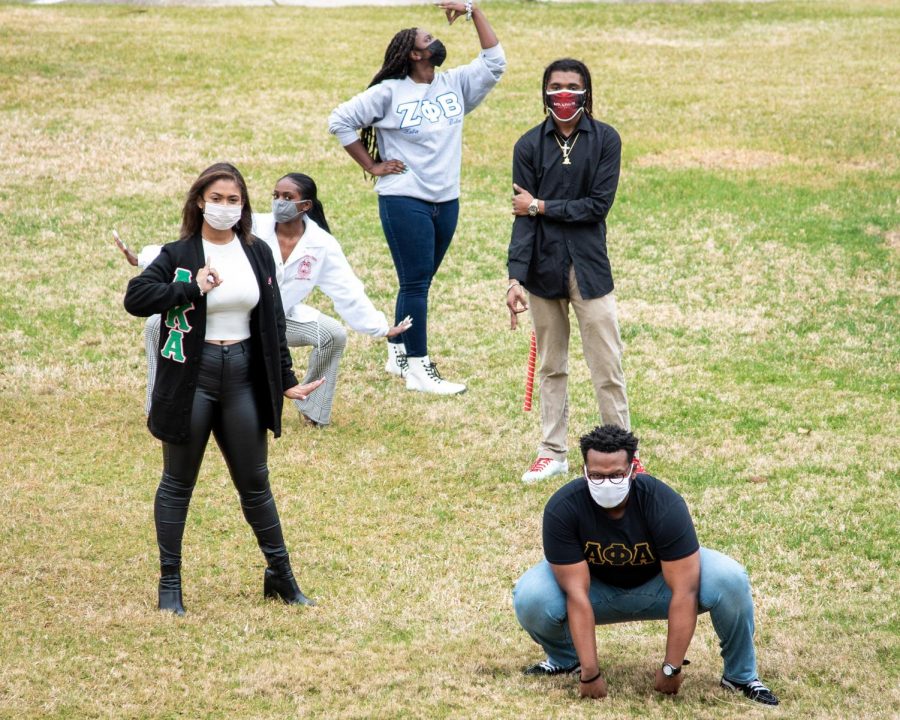Black fraternities and sororities on campus hold rich history, lifetime commitments
Lauren King, Sikudhani Foster-McCray, Alyssa Cooper, Sloan Brignac, and Brandon Vincent, all members of historically Black fraternities and sororities, pose while on campus. For many students at Loyola, the culture of the historically Black fraternities and sororities is an integral part of their identity on campus. Photo credit: Michael Bauer
February 3, 2021
For most, it was just a Sunday. For others, it was Alpha Kappa Alpha’s sorority initiation day. For Lauren King and her line sisters, it was the first day of the rest of their lives.
Now, AKA’s Eta Theta Chapter President, King became a part of something greater that spring Sunday in 2019, the day King had waited for since she was a little girl. The National Pan-Hellenic Council, the umbrella council composed of the Divine Nine historically black fraternities and sororities, surrounded her throughout life. It was in that room on that Sunday, hand-in-hand with her new sisters and her own mother that she realized the impact of her lifelong commitment.
King had seen Divine Nine brothers and sisters at church and school. She’d found them in her family and friends, and her mother was the AKA woman who ushered her into the NPHC kingdom.
Choosing to be a member of a Divine Nine organization is no easy task. Finding an exact fit took research, calculation and preparation, and King knew she’d made the right choice to be at home with AKA.
To King, being a part of a Divine Nine organization is about stepping into the glory of something that’s larger than you. The best part for her was being able to call her mother her sister, too.
The Divine Nine organizations, five of which are chartered on Loyola’s campus, are fraternities and sororities that hold a standard of lifetime commitment for their brothers and sisters, one that carries a deep, rich history of fraternalism.
Sikudhani Foster also knew that being a part of a Divine Nine organization was in the stars for her.
Now the audit chair for Nu Mu Citywide Chapter of Delta Sigma Theta, a historically Black sorority, Foster said her parents attended HBCUs Spellman and Morehouse in Atlanta. She’d heard of Divine Nine organizations and their notoriety within the Black community since she was a little girl.
Foster said she liked what the women within her organization were doing when she first arrived at Loyola’s campus. She noticed Delta women serving the Loyola community and lifting up the its Black student body.
One Delta was president of the Black Student Union and a few held positions within athletics. No matter where she turned, one thing rang true, women of Delta Sigma Theta were involved. She said that Delta’s involvement on campus inspired her and that being a Delta woman was a part of who she was meant to.
“I wanted to do something to uplift Black women, so I chose to choose a Black Greek letter organization,” Foster said.
For Foster, Divine Nine organizations are unlike any other.
Brandon Vincent, chapter president of the Rho Epsilon chapter of Alpha Phi Alpha Fraternity, Inc., said his journey home to Alpha began as a child.
He’d heard of Alpha as a 10-year-old boy when his older brother, the first man in his family to join Greek life, joined the organization in college.
Vincent said he realized later that he had teachers, coaches and mentors in his life that are Alphas as well, and he thought about the impact they had on his life.
“I knew that I wanted to give back like the men before me gave back to me,” Vincent said. “I was astonished by the power that Alpha men in my life had ”
Vincent said that mentors in his life have inspired more than 10 members of his high school graduating class to become Alphas.
He said becoming an Alpha led him to consider how much of an impact he could have on others if he and his brothers used their positions the way they should— by giving back to the community and advocating for those around them.
For many members of historically Black fraternities and sororities on Loyola’s campus, the decision to join an organization belonging to the National Pan-Hellenic Council was a no-brainer.
Author and lecturer Lawrence Ross said that the Divine Nine organizations were established at the turn of the 19th century. Plessy v. Ferguson in 1896 upheld “separate but equal” racial segregation, and many Black Americans understood that their Blackness was seen as an inferior threat. As many people of color began to attend universities in the early 20th century, there was a need for people from similar backgrounds to coalesce, Ross said.
“This notion of fraternalism bonded these students together toward a more macro goal,” Ross said.
These Greek letter organizations ultimately made waves in advocating for civil rights. There was an understanding that as a collective, the organizations could make an impact, according to Ross.
Ross said there’s been a tendency for the council’s history to be hidden regardless of the difference the Divine Nine were able to make during the civil rights movement.
Gregory Parks, a law professor at Wake Forest University, said that the Divine Nine’s participation in social activism is what sets them apart from historically White organizations.
“Importantly, historically White groups may focus more so on philanthropy and community service as their ways of engaging with the community,” Parks said. “Divine Nine groups have embraced a broader approach to community uplift.”
“I think that it’s important for people who are outside of the National Pan-Hellenic Council to understand its impact on civil rights,” Lauren King, president of the Eta Theta chapter of Alpha Kappa Alpha Sorority, Inc., said.
Many know AKA women don pink, green, and pearls, but the impact organizations like AKA had on history is often forgotten, King said.
In the past, Black women weren’t allowed in other sororities. AKA changed that. Founded in 1908, Alpha Kappa Alpha Sorority Inc. was the first Black Greek sorority shortly following Alpha Phi Alpha Fraternity, Inc. , which was the first Black Greek letter organization and fraternity, founded at Cornell University in 1906.
Each organization has things that its members believe set it apart from other fraternities and sororities. Alyssa Cooper, president of Iota Omicron Citywide Chapter of Zeta Phi Beta Sorority, Inc., said she believes that Zeta’s principle of finer womanhood sets it apart.
She said all sororities advocate for service and sisterhood, the other principles highlighted by Zeta, but finer womanhood is the most important and is unique of the three.
“Being a finer woman is not only being the best you can be for yourself but being a light for those around you,” Cooper said.
Cooper said that being a Zeta isn’t about always being in the spotlight but rather about being a “light” in the community.
“I just want to emphasize that Zeta is a home,” Cooper said.
Cooper was one of five women at Loyola who worked to reactivate Loyola’s Zeta chapter. She said she felt that AKA and Delta weren’t the right fit for her, and after researching Zeta, she said she knew it would be home.
“White girls have more options, and AKA and Delta didn’t feel like home,” Cooper said.
Cooper said Historically Black fraternities and sororities call themselves the Divine Nine for a reason. Cooper said Divine Nine organizations at Loyola prove this as most Black student leaders on campus belong to NPHC. She thinks that this led to members of these organizations having higher expectations for themselves than historically White organizations on campus.
However, according to Cooper, even at Loyola, there is a standard to uphold participation in Black Greek life as perfect. There is a fear held by the organizations’ members due to their history that one slip up could lead to failure and persecution.
“We always know in the back of our heads that we cannot mess up because we will not be given the same grace as some other organizations,” Cooper said.
Despite this fear, the feeling of home that comes along with historically Black fraternities and sororities on Loyola’s campus is something that lasts a lifetime, according to their leaders.
Sloan Brignac, president of Kappa Alpha Psi’s chapter on campus, works with Kappa’s Gretna alumni chapter to keep his chapter going at Loyola.
Brignac said he’s enjoyed working with the alumni chapter of Kappa in keeping his brotherhood alive.
“It’s cool that we can all stand for one thing no matter the age difference,” Brignac said.
For Alpha, one service project that began in the 1920s resonated this year more than ever, according to Vincent.
“A Voteless People is a Hopeless People” is a service project conducted by Alpha in which members of the fraternity help community members use their voices in local and national elections by registering to vote and educating them on when and where they can vote, according to Vincent.
“It’s not just about you,” Vincent said. “It’s about the community; it’s about the way you assert yourself.”
According to Vincent, Alpha men set themselves apart from others in their dedication to their communities through service.
“Alpha men are very diverse, and we’re well represented in different industries, big and small,” Vincent said. “There’s so many things that Alpha men have done.”
Ross, an Alpha himself, who initiated in 1985, said he likes to say Alphas are “mini-Martin Luther Kings.”
Zeta’s service work has been focused on supporting Black-owned businesses this year, but every year, the chapter tries to take on a different thing, according to Cooper.
Brignac says that as a Kappa, putting yourself out there is a big part of the commitment to joining a Black Greek letter organization and the service they provide.
“You have to be willing to help someone, to put yourself out there, to make another person’s day better than it was yesterday,” Brignac said.
Parks said that a common misconception about Divine Nine organizations can be that their goal is to “step and haze.” Stepping is a dance practice commonly associated with Divine Nine organizations, and hazing is a frowned upon practice of Greek life organizations to bully and push around new members. Parks said he hopes that onlookers steer away from these initial perceptions.
“These groups have a long and rich history of philanthropy, community service, social action and civic engagement,” Parks said.
All NPHC-chartered organizations on campus said they were proud to share fraternalism with movers and shakers in the world around them. The mayor of Atlanta, Keisha Lance Bottoms, is a Delta. Zora Neale Hurston was a Zeta. Now, with Kamala Harris in office, AKA has one of their own as vice president of the United States.
“It’s funny,” Ross said. “My wife was a Delta, but when Kamala was announced as vice president, my wife danced around the living room.”
The pride shared among the Divine Nine organizations at Loyola and those chartered nationwide and even internationally is transcendent. As the motto of Alpha reads, according to Vincent, “First of all, servants of all, we shall transcend all.” Unification is the goal of Divine Nine brothers and sisters at Loyola, and the Black power deeply set in their history proves to be on their side.








